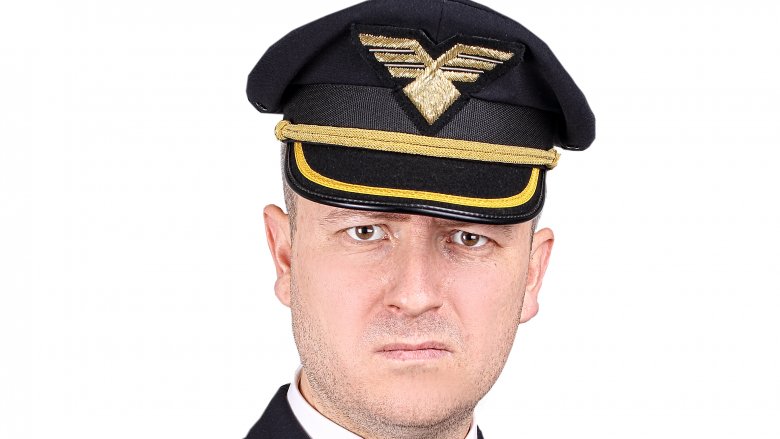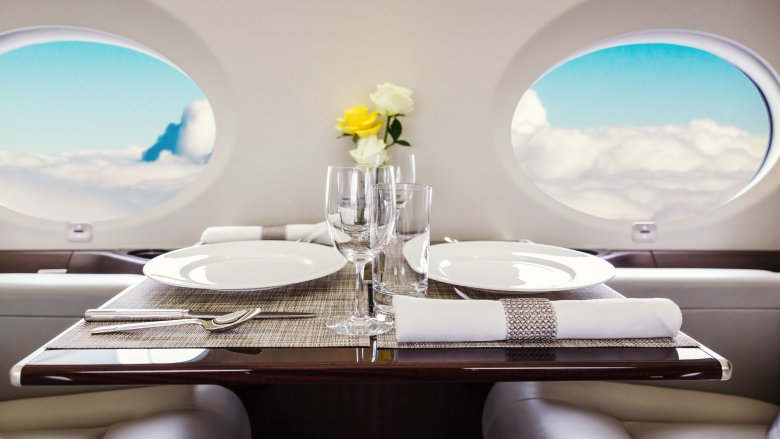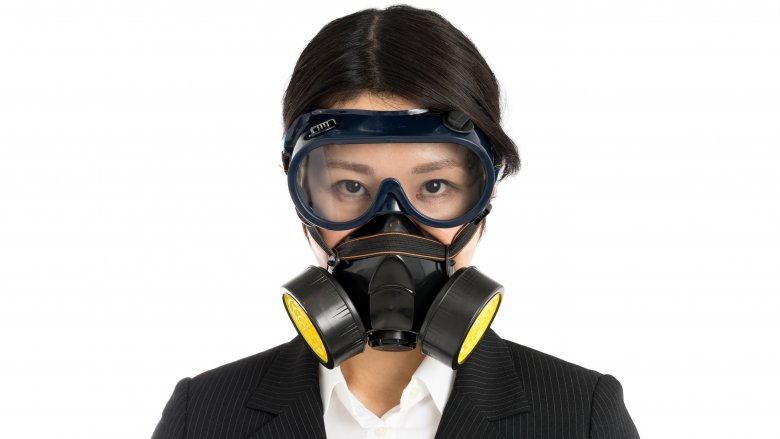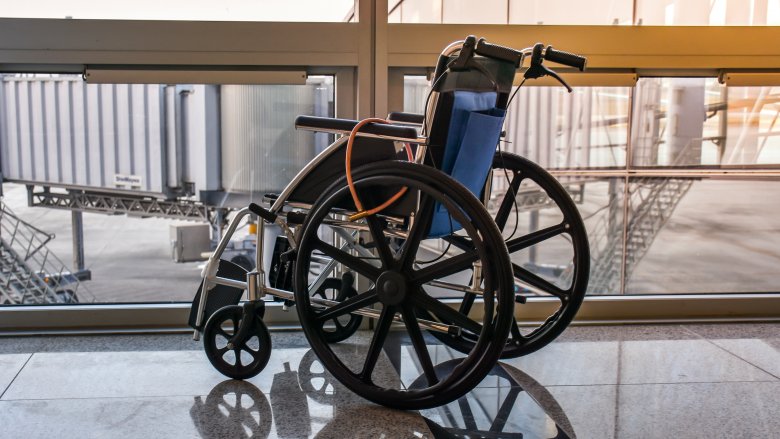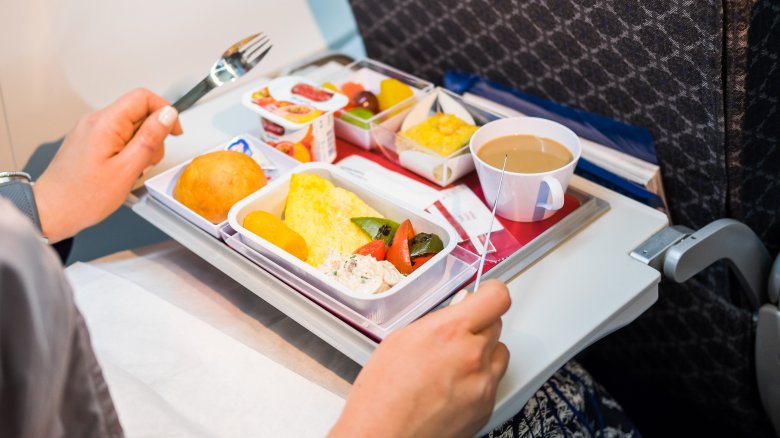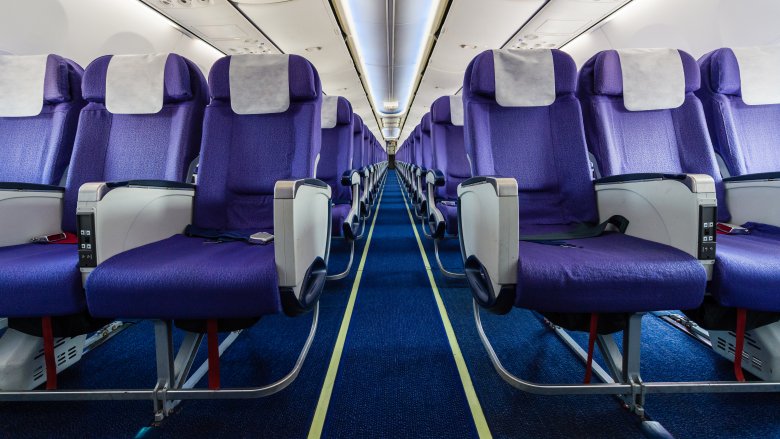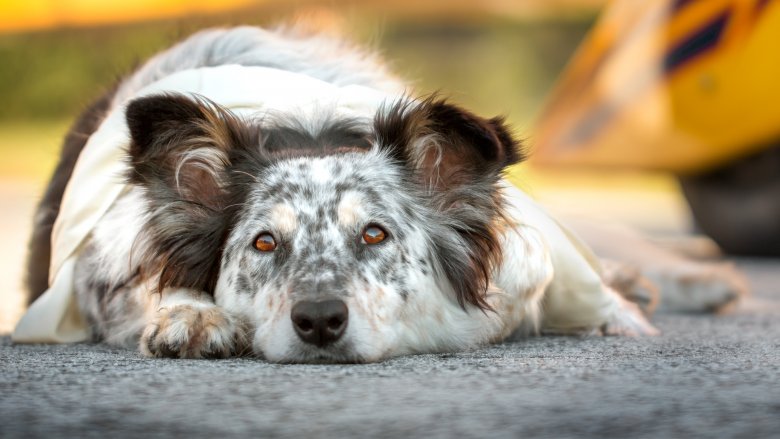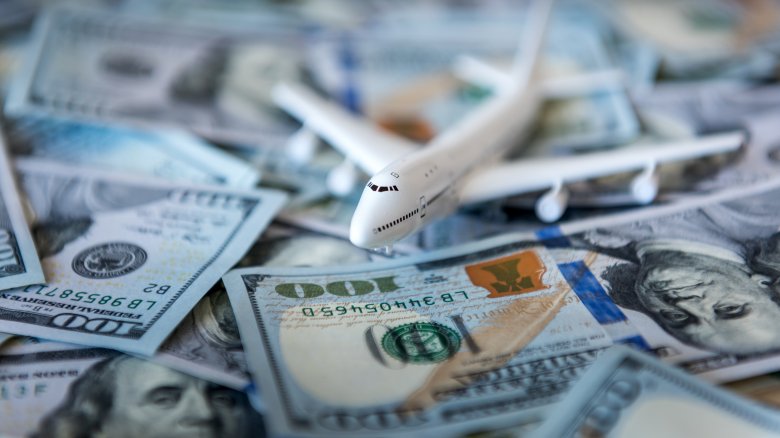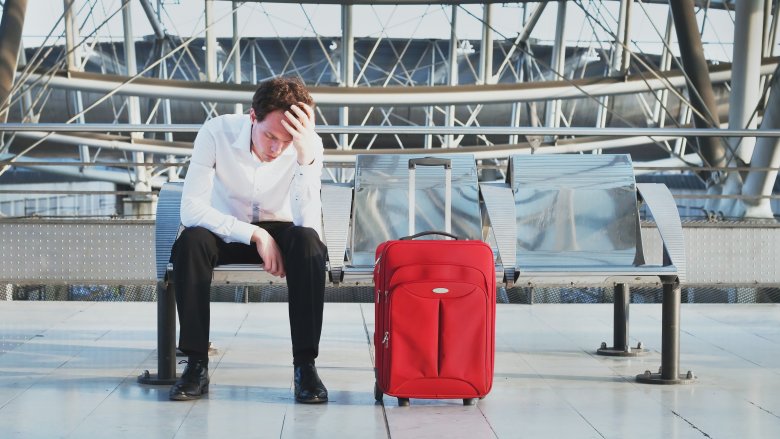Secrets Airlines Don't Tell Passengers
Airlines: gravity's greatest enemy and man's most frustrating friend. They give you sky rage and mouth sadness with their custom blend of hidden fees and cheap food, but until Nature finally invents a Pegasus, you're stuck with them. Unfortunately, equine air travel will probably take a while, but you can make the wait a little more bearable by getting to know airlines a bit better. They're a treasure trove (and sometimes a Pandora's Box) of secrets. Learning said secrets won't necessarily make your fly-time frenemies more likable, but flying the unfriendly skies may seem a little more interesting once you learn what the people who provide your horseless air carriages have been hiding from you. At the very least, it'll give you something to do while Nature works on that Pegasus.
Your pilot might be a dangerous felon
When someone's job entails making sure you don't die, it helps if they seem trustworthy. If a heart surgeon once did time for cow udder-punching or stabbing a dude with a javelin, you might think twice about letting that person cut you open. Likewise, you'd never want the person flying your plane to be a child molester. But just like Mick Jagger said, you can't always get what you want. But if you try sometime you just might find a horrifying skeleton in your pilot's cockpit.
An in depth investigation by WFAA TV revealed that a disturbingly high number of pilots have heinous criminal histories. Scores of sky cabbies in Texas, Florida, and Oklahoma have convictions for offenses like burglary, assault with a deadly weapon, and sexually assaulting children. And that list isn't remotely exhaustive. The report also highlighted examples like United Airlines pilot Mark Uhlenbrock, who in 2016 pleaded guilty to stalking his ex-girlfriend and posting naked pics of her online.
One rightly has to wonder how so many unsavory characters (Texas alone had 80 cases) slip through the cracks. Well, you'll be horrified to discover that due to a dearth of resources, the FAA stops actively screening pilots once they're hired. Instead, it relies on an honor system whereby pilots self-report crimes, substance abuse issues, and job-jeopardizing health problems. So, really there are no cracks to slip through, just a giant canyon that sometimes accommodates psychos and sickos who possibly snort coke.
Corpses get to fly first class
You and every living person you know will die someday. Unfortunately, not all of you will die with dignity. At least one of you will likely choke on popcorn while dressed as a clown at a kid's birthday party. As you helplessly flop on the floor, children and adults will laugh hysterically, confusing your final moments with a zany routine. Don't be that clown. Instead, kick the bucket on an airplane if you can. Don't cause a crash or anything; just sit quietly and stop being alive. You're less likely to ruin a child's birthday, and if you die while flying coach, you might get upgraded to first class.
As The Telegraph explained, planes don't have much space for cadaver storage. (There's already a life jacket under your seat, so a casket definitely wouldn't fit.) If there's room in first class, then that's the first place goners go. Crew members typically inform affected fliers when a corpse is coming their way, but not always. In 2007, British Airways employees plopped a dead body next to a passed-out passenger without warning. In fairness, that beats BA's old policy of giving corpses sunglasses and pretending they just were unconscious. But according to CBC News, the actually sleeping passenger disliked the surprise.
Thankfully, mid-flight deaths seldom occur. British Airways experienced 10 per year as of 2007. Just know that if you become one of those rare cases, you'll likely have extra leg room while you decompose.
Sometimes your flight gets delayed for embarrassing reasons
Delays drain the excitement from air travel. One minute you're eagerly waiting to board your flight. The next minute, you're still waiting to board. Several hundred minutes later, you're waiting and bored. Then your inner monologue becomes an incoherent patchwork of impatience and inventive obscenities, and every time you ask about the hold up, you get the same stock excuses. The weather's bad; seats need replacing; the plane's covered in bees. Sometimes that's the whole story. Other times, the pilot makes you late by throwing a half-naked tantrum.
Just don't expect an airline to tell you that. According to flight attendant Elliott Hester, problems like pilot nudity get covered up to avoid embarrassment. In the tantrum incident, for instance, an angry aviator delayed departure by five hours because he didn't want to remove his belt during a security screening. To show his disapproval, he took off most of his clothes like a crazy man and promptly got arrested. In an unrelated debacle, a different pilot purportedly was jailed for wandering New York in the buff. As a result, his passengers had to wait an extra day to travel.
Hester also recalled setbacks that occurred because a captain forgot to go to work or opted to go golfing instead. That is impressively unprofessional. You'd think hiding these transgressions requires enough lying to turn an airline's pants into a towering inferno. But surprisingly, they get a lot of mileage out of euphemisms, omissions, and (probably) flame-retardant pants.
The air inside your plane is sometimes toxic
Travel etiquette demands you don't stink up an airplane with chili farts and body odor. Nobody wants to smell that. But butt fumes seem like roses compared to what your plane occasionally puts out. Citing research published by the World Health Organization, The Telegraph reported that each year, billions of air travelers and hundreds of thousands of airline employees inhale harmful chemicals while sitting on planes.
The host of hazards includes hydraulic fluid, engine oil, and various potential neurotoxins that sometimes seep into the cabin's air system. Prolonged exposure can lead to minor maladies like rashes and deadly diseases like cancer. Sadly, these effects aren't just theoretical. In 2016 ABC spoke with ex-airline pilot David Hill and former flight attendant Denise Weiss. Both of them endured the debilitating effects of inhaling tricresyl phosphate (TCP), an engine oil additive that reeks of unwashed socks. Hill lost his short-term memory, his sense of balance, and his job. Weiss sustained "central nervous system damage" that caused inconsistent bouts of pain.
Before you start boarding every plane with a gas mask, understand that chemical leaks are uncommon. The BBC reported that they happen about once per 2,000 British flights. The FAA similarly confirmed that most American planes refrain from poisoning passengers. However, they're common enough that 3.5 billion travelers worldwide were exposed to contaminated cabin air in 2015. So maybe go ahead and wear that gas mask and feel free to pass gas.
If you have a disability, flying will likely suck
Navigating a massive airport seems daunting under the best circumstances. Now imagine trying to do it as one of the characters played by Gene Wilder and Richard Pryor in See No Evil, Hear No Evil. If you pick Wilder, you'll be unable to hear important information about your flight, and as Pryor you couldn't read signs or watch where you're going. In theory, airlines eliminate these issues by allowing people with disabilities to request airport assistance. In practice, airlines are often helpfulness-impaired.
A 2017 report by Wired covered a minefield of mishaps that plague disabled air travelers. It noted multiple instances in which hearing-impaired customers either missed flights or boarded the wrong plane because crucial updates like gate changes were only communicated orally. Such issues often arise from the fact that different disabilities aren't properly differentiated. Technically, codes exist to specify what special needs a traveler might have. But according to the Open Doors Organization, a nonprofit that specializes in travel accessibility, the standard practice is to set up a "wheelchair meet-and-greet" and little else.
That startling lack of distinction might explain why disabled air passengers have become increasingly critical of airlines. Per USA Today, a federal watchdog found in 2017 that "the number of complaints against airlines from disabled travelers doubled in a decade to more than 30,000 in a year." The grievances included difficulty dealing with service animals, inhospitable seating, damage done to aid devices, and a fundamental incapacity to be accommodating.
How to improve your in-flight meal
Every stand-up comedian, sit-down cynic, and human taste bud agrees: Plane food is tongue torture. Even that guy who allegedly found a hypodermic needle in his airline-provided butter chicken probably thought it added flavor. Luckily, you don't have to stab yourself in the mouth to have a memorable in-flight meal. According to CNN, you just have to know which food to order.
Not all foods are equally suited to air travel, especially given scheduling and regulatory constraints. Menus are hammered out up to a year in advance to allow for safety-related adjustments. This not only restricts the range of foods that an airline can reasonably offer, but also determines how it's cooked. Food is prepared six hours before takeoff and has to be reheated on the plane, meaning certain meats and pasta in general tend to taste worse than usual. Your best bet for a non-terrible eating experience is an in-flight stew, which withstands prolonged reheating without a reduction in quality. Fried rice and vegetables are apparently also safer choices.
If you hate stew and rice won't do, you might want to invest in some noise-canceling headphones. As The Telegraph pointed out, eating at higher elevations dulls your perception of certain flavors. Throw in the constant roar of a plane engine and you're in sensory hell. Conversely, drowning out ambient noise gives your tongue a boost. And if your meal tastes like ear wax, just remove the headphones and sprinkle your food with hypodermic needles.
Plane food is super unhealthy
Now that you know how to pep up plane food, here's why you shouldn't eat it. Per The Telegraph, airlines dump 30 percent more sugar and salt into their meals than you would normally get on the ground. They're not trying to kill you, but help you get over that sensory hump you encounter while flying. Without that extra flavoring, your meal would probably taste like air with a side of nothing. But with it, your food feels like diabetes and hypertension.
Oxford University professor Charles Spence weighed in on the problem of plane food and concluded that various factors combine to sabotage your blood pressure and glucose levels. Sitting still for several hours is boring, and unless you're going eat your annoying seatmate, food provides a way to pass the time. In-flight movies only exacerbate the problem because people often eat while watching television. Simply seeing a film can trigger someone's face-stuffing reflex. Also consider the physiological effects of high-calorie food. According to research cited by CNN, high-calorie foods "may cause cocaine-like addiction."
In short, eating airline food is somewhat akin to turning your stomach into a dumpster because your brain can't quite help itself. According to Professor Spence, estimates suggest "the British consume more than 3,400 calories between their check-in at the airport and their arrival at their destination." That's kind of terrifying and depressing. But don't despair because there are common sense ways to combat trash-gut, like eating in advance and drinking plenty of water.
Airplane seat sizes aren't regulated
Much like in-flight meals, airplane seats have long been a sore spot for travelers, particularly those who fly worst class. Granted, people get what they pay for, but passengers don't try to buy claustrophobia and knee pain. Rather, airlines have bought into the practice of gradually reducing seat sizes to fit more passengers and make more money. That's fine in principle, so long as companies don't go overboard. The problem is that no one has defined what "overboard" means.
Per Bloomberg, there are literally no official rules governing seat size minimums. Airlines simply need to prove that "a fully loaded plane can be evacuated within 90 seconds with half the exits blocked and in low lighting conditions." As long as your compacted legs can propel you to safety, plane makers and flight providers are in the clear. That creates lots of leeway to pack planes tightly. So airlines simply wing it, resulting in increasingly decreasing space.
The passenger advocacy group Flyers Rights claimed that airplane seats have shrunk from 18.5 inches wide to 17 inches since the early 2000s. The gap between seat rows, or "seat pitch," has purportedly dropped from 35 inches to as little as 28 inches for some airlines. Is that unsafe? Nobody knows, except the FAA, which withholds the relevant data for commercial reasons. So Flyers Rights sued the FAA. In 2017 a U.S. appeals court urged aviation officials to consider setting official minimums for their "incredible shrinking seats."
Most pet deaths occur on the ground
For many pet owners, sticking a furry loved one in a plane's cargo hold verges on animal cruelty. Being trapped in a cage with nothing but loud, alien sounds and occasional turbulence as entertainment would jostle the nerves of most humans, let alone an uncomprehending creature that had no say in the decision. In fact, a study published by The Canadian Journal of Veterinary Research suggested that sedating dogs (in this case, beagles) during flights did nothing to ease their stress. Even the world's Snoopys fear flying, and they practically invented canine air travel. However, being in the sky is the least of your pet's worries.
In an interview with USA Today, veterinarian Laurie Coger allayed concerns that flying greatly endangers animals. Instead, "most injuries, escapes, or deaths occur on the ground. Heat stroke, injuries due to crates being dropped or broken, or other mishaps are most likely during loading and unloading." Not only are pets safer while off the ground, they're probably also more comfortable. During a flight, the plane's cargo area matches the cabin in terms of overall climate. While the plane's on the tarmac, however, temperatures can jump and drop drastically, potentially frying or freezing your pet.
The confusingly titled Every Dog's Legal Guide delved into the threats that beset man's best air buddy. Disturbingly, some airline employees have neglected to load dogs onto planes, placed them on incorrect flights, left them in the rain, and even stored them as lost luggage.
Nonrefundable tickets aren't always nonrefundable
Unless you're a businessman, bajillionaire, or really hate commitment, you've probably never purchased a refundable airline ticket. As the Washington Post observed, refundable tickets can cost three times the price of their nonrefundable counterparts. Quite frankly, there are way better ways to burn money, such as setting it on fire. Thus, the optimal option is to buy a nonrefundable ticket (and maybe a lighter) and hope you don't miss your flight.
Unfortunately, the best laid flight plans of mice and men sometimes go awry. Maybe a night of blackout binge drinking or a morning of inspired shower karaoke throws you off schedule and makes you miss your flight. In cases like that, you can kiss your ticket fare goodbye. But if too many naked pilots get arrested and your flight gets nixed, you're in luck. As it turns out, airlines have to repay you for nonrefundable tickets when they cancel on you.
It gets better. You actually have 24 hours from the time of your "nonrefundable" purchase to change your mind as long as your trip doesn't occur within 7 days of your scheduled departure. That means commitment-phobes who change their minds really quickly don't have to waste money on refundable airfares. An airline might also cut you a break if something awful happens, like a brain tumor. However, it's worth noting that even in that extreme case, the passenger only received a refund after the Washington Post intervened. So don't expect much compassion.
Compensation for delays is sometimes mandatory
Like most people, airline execs are down-to-earth, bewilderingly wealthy sky barons who put their pants on one million-dollar leg at a time. Every cent their companies spend makes the difference between enjoying a gourmet meal and forcing down whatever sweet-and-salty garbage passengers eat in coach. Hence, airlines reduce costs by spelling out all the ways they won't help you when something goes wrong. However, restrictions on compensation are themselves legally restricted.
As a general rule, airlines in the U.S. adopt a "sucks to be you" approach to flight delays. But USA Today noted that in certain situations, they have to pay for making you late. For example, if an airline forces you onto a different flight –- or "bumps" you -– it owes you up to $400 (or the cost of a one-way ticket) if you reach your destination one to two hours later than your original arrival time. If you arrive more than two hours late, that cap jumps to $800.
Things get even cushier for travelers in the European Union. According to The Telegraph, EU Regulation 261/2004 requires EU carriers to "provide food and drink appropriate to the time of day" plus "a means of communicating your delay or a refund of the cost of essential calls" if your departure gets pushed back by three or more hours. If you have to wait overnight, airlines must to book a hotel room or pay your way home. Presumably, the EU has a ton of pilot strippers.
